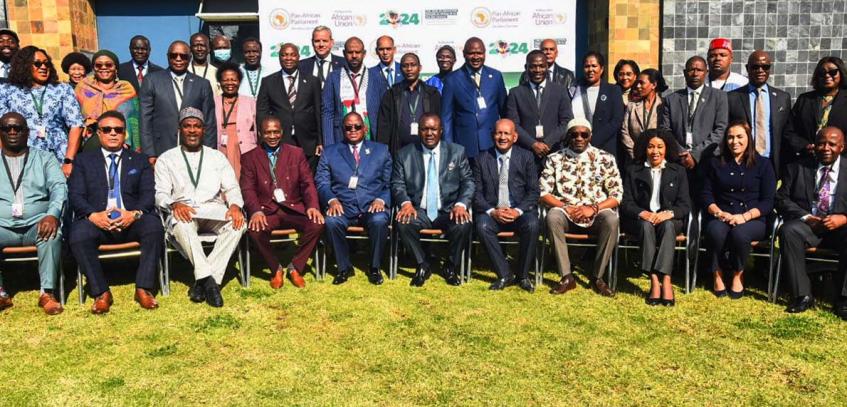The Pan-African Parliament President, H.E Chief Fortune Charumbira, has urged Africans to invest in education. He spoke during a workshop held on the African Union (AU) theme of the year 2024, “Educate an African Fit for the 21st Century: Building Resilient Education Systems for Increased Access to Inclusive, Lifelong, Quality, and Relevant Learning in Africa.”
While acknowledging the work done by various African countries, H.E Charumbira encouraged Pan-African Parliament members and their respective national parliaments to utilize national resources to completely transform their education sectors.
“The Pan-African Parliament and national parliaments must mobilize domestic resources for the transformation of the education sector,” said H.E Charumbira while addressing delegates and parliamentarians at the ongoing 3rd Ordinary Session of the 6th Parliament of the Pan-African Parliament in Midrand, South Africa.
“Education is considered a universal human right and a public good and responsibility. Sadly, many children on the continent do not enjoy this right due to inequalities in existing educational systems based on region, gender, and economic status. This means that securing the necessary resources to reform our education system is non-negotiable.
“African parliamentarians have a critical role in ensuring that adequate resources are allocated to this important sector both nationally and continentally. We need to leverage our control of the national purse to mobilize adequate resources to equip young people with quality education and in-demand skills and to empower all children regardless of gender, status, level of education, or ability, so that no one is left behind. Together we can spearhead an educational turnaround in Africa,” said H.E Charumbira, calling upon parliamentarians and other stakeholders to move the education agenda in Africa from mere rhetoric to concrete action.
The President appreciated efforts made by African member states to ensure access, completion, and quality of basic education for all thus far.
“The 2022 UNESCO Report on Education in Africa acknowledges that the proportion of out-of-school children had decreased until around 2010. Completion rates had improved in primary and lower secondary education, as well as access to and participation in Technical and Vocational Education and Training (TVET).
“There was also noticeable progress in access to pre-primary education and in adult literacy and lifelong learning. Concerning school feeding, low-income countries have doubled their national budget expenditures from 17 percent to 33 percent between 2013 and 2020,” he said, also stating that in lower middle-income countries, national budgets now account for 88% of school meals financing, up from 55% in 2013.
H.E Charumbira underlined that, while these strides are commendable, it is sad to note that in this 21st century, Africa still faces significant challenges in the education sector. He further highlighted that some of the gains Africa had made were reversed by the onset of the COVID-19 pandemic.
“We have to note that, although the out-of-school rate keeps steadily decreasing, especially at the primary level, the absolute number has reached an alarming global estimate of 98 million in Africa. The learning poverty rate, the share of children who cannot read a simple text with comprehension by age 10, was the highest in sub-Saharan Africa before the COVID-19 pandemic, at 86%. Realistically, this rate is likely to have worsened after the pandemic, now estimated at 90%. This means that nine out of ten children cannot read a simple text with comprehension by age 10,” he added.
He also cited that Africa would need around 17 million additional teachers to achieve universal primary and secondary education by 2030. He further estimated that Africa would account for more than 90% of global external financing needs for education by 2030, with an additional US$40 billion needed to finance education to achieve SDGs for education and move towards meeting the aspirations of Africa’s Agenda 2063.
H.E Charumbira encouraged parliamentarians to mobilize resources for Africa to experience better, quality, and relevant education.
Echoing the President’s sentiments, Hon. Bertin Koudio Kouakuo , Chairperson of the Committee on Education, Culture, Tourism, and Human Resources Education, underscored that education in Africa is still a major challenge in the 21st century that needs urgent attention.
“It is crucial to build resilient education systems that can not only withstand crises but also provide inclusive, quality, and relevant education throughout life. That is essential for the sustainable socio-economic development of the continent,” said Hon. Bertin.
He suggested that “an Africa we want” needs proper teacher training; school curriculum reforms; regular evaluation and monitoring programs; technology integration; digital education; ICT training; internet infrastructure as a means of growth; and sustainable financing of education.
In a statement read on behalf of the African Union Commission, Commissioner for Education, Science, Technology, and Innovation (ESTI), H.E Prof. Mohammed Belhocine challenged parliamentarians and other stakeholders to drive an education agenda that will move the continent forward in terms of addressing the barriers to inclusivity, affordability, accessibility, and applicability for better educational outcomes.
“For Africa to develop sustainably and equitably, it is imperative to build resilient, inclusive, quality, and relevant education systems. This requires concerted efforts by governments, communities, teachers, students, and international partners to create an educational environment conducive to lifelong learning,” he said.
-Ends-








